- Home
- C. Robert Cargill
We Are Where the Nightmares Go and Other Stories Page 2
We Are Where the Nightmares Go and Other Stories Read online
Page 2
Wilton sighed. “Well, the radio’s quiet. Let’s hope it’s just the phone tonight.”
The phone rang again, Milo snatching it immediately out of its cradle. “Sheriff’s station. Deputy Manning.” The static wobbled a bit, oscillating behind the pops and crackles. “Hello?”
Milo set the phone back down into the cradle.
“How is everybody doing tonight?” he asked.
“Welp,” said Wilton, “your brother’s a bit drunk already.”
“He hasn’t been sleeping. Not since last week.”
“I heard. What’s his temperament been like?”
“Cranky. Someone said something to him last week that stuck with him. I see him pacing around the yard, waving his fist in the air.”
“Is it—”
“Nah. It’s just a thing he does when he’s arguing with himself. He kinda tells whoever he’s pissed at all the things he wishes to tell them so he doesn’t actually have to tell them. You know?”
“Yeah,” said Wilton, “I figure I do.”
The station radio crackled, squealing a long, wicked note that sounded like a scream passed through two tin cans and a piece of string. Wilton and Milo looked up at the nearly antique radio setup, then back at each other.
They threw their fists down in quick succession. One, two, three! On the third beat Wilton stuck out two fingers; Milo stuck out three. Odds. Milo hung his head and sighed before standing, resigned, and walking over to the radio. He pushed down the call button.
“Sheriff’s station. Deputy Manning.”
The static thrummed for a moment. Crackles. Pops. A tiny whistle of squelch.
“MANNING!” screamed the angry, garbled static.
“Yes,” said Milo. “This is Deputy Manning.”
Jesse kept a cot in the corner behind the bar for the nights that Jason tied one on too quickly. Tonight Jason was just tired, and the drink had finally coaxed him into a pleasant drowsiness. On the upside, no one had to deal with Jason’s dour fucking grumbling; on the downside, they had to listen to him sleep. Sometimes he talked. Sometimes he said weird shit. But sometimes, sometimes, he just sang. And that was the thing he did that set everyone’s teeth on edge.
Jason mumbled from his cot, alcohol practically steaming off his breath, his eyes still closed tight. Everyone in the bar looked up at once as he continued his slurring speech in his sleep, singing a song tunelessly.
“What the hell is that?” asked the bartender.
“Wu-Tang, maybe?” offered the ’stache.
“That ain’t Wu-Tang,” said the mullet.
“I said maybe,” said the ’stache.
“Anytime he says something that sounds like nigga you always go to Wu-Tang.”
“And sometimes I’m right.”
“It’s OutKast,” said the rent-a-cop from the back of the bar. “‘Bombs over Baghdad.’”
“What year was that?” asked the bartender.
“Oh-one or oh-two,” said the rent-a-cop. “Can’t remember which.”
The ’stache pulled out his phone, googling the song. “December, aught-one.” He looked up. “Who’d we lose back in aught-one?”
“Geraldine’s boy,” said the bartender. “But that was before December.”
“Be at least oh-two,” said the mullet. “No one died in December.”
The bartender nodded. “Robbie Witherspoon had his accident down at the mill. That was spring of oh-two, wasn’t it?”
“Yeah,” said the ’stache. “Mrs. Gillespie had her heart attack.”
“She was sixty-four,” said the mullet.
“I know that.”
“You know many sixty-four-year-old OutKast fans?”
“We’re just listing names.”
“That’s not what we’re doin’ and you know it.”
“Oh, shit,” said the bartender, “the Wilkins kid. Had that car wreck in the fall after the football game.”
“Oh, yeeeeeeah,” said the ’stache, the mullet, and the rent-a-cop all at once.
“It’s probably the kid,” said the mullet.
“I liked that kid,” said the rent-a-cop.
“This is bad, isn’t it?” asked the ’stache.
“It’s not always bad,” said the bartender.
“But it’s sometimes bad.”
“Yeah, but not always.”
“What do you reckon we should do?” asked the mullet.
“Let him sleep,” said the bartender. “Maybe it’s nothin’.”
“But maybe it’s somethin’,” said the ’stache.
The bartender nodded, plucking another glass from the depths of the dishwater in the sink, and stabbing his ratty white rag into it. “And if it is, we’ll know soon enough, won’t we? Ain’t nothin’ to be done unless we get a call.”
They all stared at the large black phone in the corner, wondering if at any moment it might scream with that terrible, sonorous ring it had.
Jason stirred awake with a snort, chased from sleep by terrifying dreams. The dreams were getting worse these days, guilt—even guilt he didn’t deserve to take upon himself—prying open his eyelids every time he lay down. He looked around at everyone staring at him. “What the hell you assholes looking at?”
They looked at each other.
“What the hell did I say this time?”
“You were singing again,” said the ’stache.
“Shit.”
Harrod and Allison Gorski’s trailer was the closest thing Pine Hall Bluff still had to a butcher. If it was meat and it was in town, either it was frozen and brought in by truck or it was hunted and trapped by the Gorskis. Either way, they sold it at the crossroads of the highway and the now-closed road to the mine. You generally never saw them out after nightfall, but sometimes, when they got caught up chasing game or it took longer to clear the traps than they thought it might, they’d find themselves in the woods after sunset, hauling ass home before the stars wheeled all the way into view.
This night, however, they got caught out far later than most. Animals had sprung a lot of traps that day, and if they left them out there too long, bobcats or foxes would set in upon them and steal a hard-earned kill. Harrod had wanted to give up whatever was left to the woods the minute the sun slipped behind the tree line, but Allison wasn’t going to miss out on a cent.
Times were getting harder, paychecks thinner, and no one was ever going to buy their house. She wanted to leave, wanted nothing more of these woods. So she let greed get the best of her.
And then night fell.
Harrod was nervous as they approached the trap. The wildlife had already ceased chirping, croaking, or clicking, and the hard chill had begun to set in, mist wafting slowly over sweating earth.
His boots crunched through dead leaves, sunk into soft earth.
A small bit of fog blew over the trap, revealing the chain, the snap, and a single fox leg, gnawed off at the hip.
“Goddamnit,” whispered Harrod, slowly unslinging the rifle from his back. “Ally, we got another one.”
There was no answer.
“Ally?” He turned around, his wife twenty feet behind him, frozen in place, her eyes burning a hole through him. She quickly cast her gaze over to the side and he saw it as well: a three-legged fox, growling, eyes blazing unnaturally, ready to pounce.
Harrod hefted his gun.
“Whatever you do,” said Allison through gritted teeth, “don’t kill it.”
Harrod nodded silently, leveling the rifle.
The fox stood motionless, waiting for either of them to move, the wound on his hip oozing and raw.
Harrod’s finger hovered over the trigger.
The fox darted, leaping at Allison.
Harrod fired.
The fox’s head exploded, its limp, headless body tumbling into the brush.
“No!” screamed Allison before stopping, frozen, arm extended, her eyes beginning to glow unnaturally. She turned and looked at Harrod, mouth curled in a snarl, eyes brewin
g with hate.
“No, no, no, no, no . . .” muttered Harrod, backing away slowly. “No, baby, no.”
Allison held her arms out wide, her body levitating six inches off the ground, her head thrust back. She shrieked in angry horror, filling the woods with a cry like an animal being slowly slaughtered. The trees shivered and the ground trembled and the whole of the night seemed to flee at the sound.
Harrod ran. There was no way he was shooting his wife. Not unless he had to. So he ran up the steep hill blindly through woods, praying silently that his wife wasn’t following close behind.
The large black phone rang.
“Sheriff’s station. Deputy Manning.” Milo cast a stern look over to the sheriff. “Yeah?” He paused. “I’ll let him know, thanks.” He rested the phone back in its cradle.
“What is it?” asked Wilton.
“Mrs. Chambers. Says there’s fog.”
“Fog or fog?”
“Fog.”
“How high?”
“About eight feet, I reckon. Said it was touching the awning of her house.”
“Yeah, that’s about eight feet.” He muttered a few swears under his breath.
“I wouldn’t worry too much, Sheriff. Could still be a quiet night.”
The phone rang again. Wilton gave Milo a withering glare as if he’d somehow jinxed them both.
“It’s probably just one of them,” said Milo, picking up the handset. “Sheriff’s station. Deputy Manning.” There was a long-drawn-out silence as Milo simply nodded, expression darkening. “Right. Well, lock yourself indoors. Don’t go near the windows. And we’ll be up as soon as we can.”
Wilton was already buckling on his holster when Milo hung up. “Who is it?”
“Allison Gorski. She’s gone and run off into the woods.”
“Is it—”
Milo stood up, pulling a well-worn, stained department jacket from the back of his rickety chair. “Yeah, looks like it. Says it started as a fox, but now it’s got Mrs. Gorski.”
“Damn it,” cursed Wilton. “How many damned times have I told those assholes to clean their traps before sunset?”
“Seven. At least whiles I was around.”
Wilton glared again. “I was being rhetorical.”
“Sorry, boss.”
“Just get the ammo. I’ll make the call.” He picked up the handset. “And here I had a good feeling about tonight.”
Milo turned to walk to the armory, then stopped, turning back around. “Can I be honest with you?” asked Milo.
“Yeah.”
“I hate your good feelings.”
“They’re not always wrong,” said Wilton in almost a wilting whimper.
Milo gave a shake of the head, sort of nodding without fully committing.
“Just get the goddamned ammo.”
Jason sipped at two fingers of Buffalo Trace from a thick-bottomed glass as he stared mindlessly at his reflection in the dark gas station window, whispers and melodies beginning to creep in through the back of his mind. While he’d sobered up a little during his nap, he was still a little hazy, nursing a buzz that a little more work would bring back up to speed. He thought about throwing back the glass in a single swallow, slamming it down on the bar top, and loudly ordering another, but it was still early yet, and getting good and proper hammered probably wasn’t the best idea. But he wanted to. He really, really wanted to.
And then the phone rang.
Everyone else looked up, staring at it ominously. But not Jason; Jason took another sip and set the glass down on the counter.
The phone was large, old, heavy, and black, its plastic scuffed, chipped in places, exactly like the model at the police station, but its ring was even deeper, more sonorous, lasted a little longer, as if the clanger was pissed off at the world and wanted to wake it, screaming with each strike of the bell. Everyone knew what it meant; after all, it only ever rang for one reason.
Jesse picked up the phone. “Murphy’s,” he said, just in case. “Yup.” Then he hung up the phone, walked over to Jason, and gently pushed his whiskey out from in front of him. Jason looked up, eyes bitter.
“I was drinking that.”
“I reckon you were,” said Jesse. “I’ll make you some coffee.”
“What is it?” asked the ’stache.
“Anyone in trouble?” asked the mullet.
“It’s always someone in trouble,” said the rent-a-cop. “They don’t call Jason for any other reason.”
“A man can hope,” said the ’stache.
“Not in Pine Hall Bluff, he can’t. Hope died down in that mine with all the rest of them.”
“Padre?” called Wilton into the candlelit dark from the doorway of the church. He stood there, hat in hand, refusing once more to step in any farther.
The priest slunk out from his darkened rectory, shirt untucked, clerical collar undone and splayed out at the neck like a bone sticking out of his throat. His eyes were weary, full of dread at the sight of the sheriff. He shook his head, broken. “What happened to that good feeling of yours?”
“It was only a feeling. I’m told they’re not so reliable.”
“Wilt, how much longer you think we can keep this up?”
“As long as we have to. Or as long as we can. Whichever comes first.”
“I can’t do it. Not tonight. Not again.”
“You can do it.”
“I’m tired, Wilt. I know you’ve got to stick around and play sheriff, for whatever reasons—”
“I’m not playing anything,” said Wilton sternly, his eyes squinting in his patented glare.
“Wilt, you were never elected. You inherited the job, and nobody questioned it because everyone else left. Being the last man standing is admirable and all, but there comes a time when you have to admit that this isn’t your fight.”
“Padre—”
“For the love of God, stop it with the padre. My name is Jeremy.”
“You’re a man of the cloth, Padre.”
“For the time being.”
“Well, I ain’t calling you Jeremy.”
“I’m a man, not a job.”
“No one in Pine Hall Bluff is anything but their job anymore. That’s kinda the point of the place. It’s what we’ve become.”
Father Paddock walked forward, nodding gently, and sat down in a pew. “You know,” he said, holding up his two-fingered hand, “they call us the fishers of men. But when people say that, they think of the disciples in rowboats, casting nets out into crystal-clear still water on a warm sunny day. They don’t think of a small boat in the North Atlantic, being tossed around like a fucking toy, the men inside it being battered and bruised, terrified that the next wave is going to swallow them whole and cast them down into a frozen grave no one will ever find. They don’t think about the man who loses half a hand to a stray fishing line, or that his shipmates are so used to such things that they react to it instinctively and expect you to finish up your shift after they stitch you up. They don’t think of the men shivering, icicles streaming out of their beards, desperate for just one night in a warm bed, being held by someone who cares about them. No, they think it’s all about that fucking rowboat on still fucking waters in the middle of the fucking Mediterranean. They think being a priest comes with all the answers. That we’re not men anymore. That we’re not normal. That we wear the armor of God against the day-to-day awfulness that tries to kill our spirit.” He folded his hands in his lap, staring up at Wilton. “I’m just a man, Wilt. There’s no armor left. No magic. Just a man in a boat, scared shitless, waiting for the next wave.”
“Fishers of men,” said Wilton. “They don’t just say that. It’s from the book of Matthew. Chapter four, verse nineteen.”
The priest looked up, surprised. “Yeah,” he said, somewhat enthusiastically. “You’ve been reading.”
“There’s only so much of this shit you can see before you have to acknowledge that there’s something bigger going on.”
�
��You won’t find the answers in there. That book is only questions.”
“Well, I have to try.”
The priest sat back, sighing. “So how much longer can we keep that up before we crack . . . or go the way of those things?”
“One more night,” said Wilton.
“It’s always just one more night.”
“That’s the only way we’ll make it. It’s the only way any of us will make it.” The sheriff sighed. “Look, there’s a woman out there with one of those things in her. She’s deep in the woods, probably headed back to the breach. She’s dangerous, she’s alone, and she needs our help. It takes at least three men to save her—the body, the gun, and the holy man. Now the big man might not be right with you at the moment, but you sure as shit are right with him. He still hears your prayers. He still throws those things back where they belong. So I’m only gonna ask you one more time: are you gonna get your goddamned cross and kit, or not?”
The priest nodded. “Yeah. I reckon I’ll get my kit.”
The high beams of the police cruiser cut through the night, pancaking in a sea of white against the dense tree line. Fog trickled along the ground, slowly rising, climbing. Soon the entire mountain would be swallowed whole and the things that walked the earth with it would roam, shrieking, howling, looking for something to drag back through the breach. Jason and Milo stood along the side of the road at the top of the hill, staring down into the deep, dark woods beyond the light and the fog.
“You sober yet?” Milo asked of his brother.
“No,” said Jason.
“You sober enough?”
“I’m hearing things, if that’s what you mean. Not much. But I’m starting to hear them.”
“You let me know if—”
“I need a drink,” he said, fiddling with the bandage on his arm.
“You’ll get everything you want once that sun comes up and that fog burns off. I’ll even kill a bottle with you if you like.”
“I need one now.”
“Don’t be an ass,” said Milo. “Don’t pretend you don’t know the drill. You aren’t going to impress anyone with that hard-ass routine.”
“I’m not being a hard-ass,” said Jason.

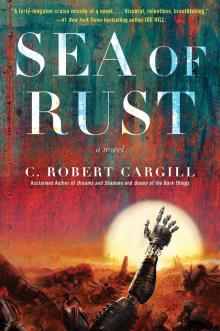 Sea of Rust
Sea of Rust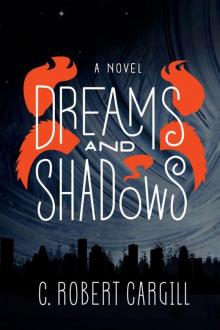 Dreams and Shadows: A Novel
Dreams and Shadows: A Novel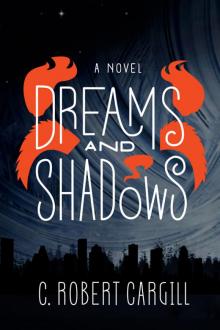 Dreams and Shadows
Dreams and Shadows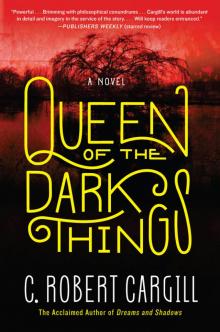 Queen of the Dark Things
Queen of the Dark Things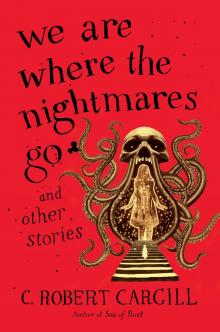 We Are Where the Nightmares Go and Other Stories
We Are Where the Nightmares Go and Other Stories